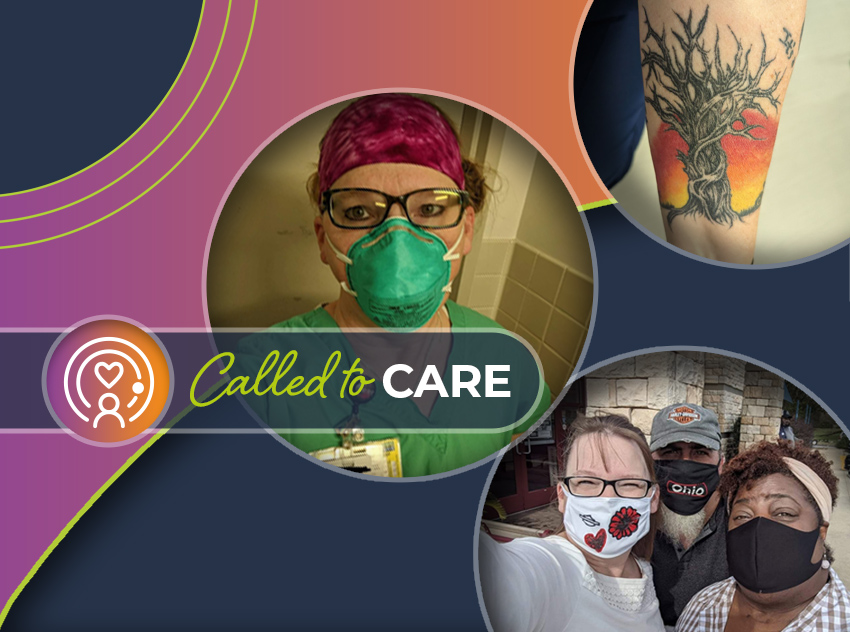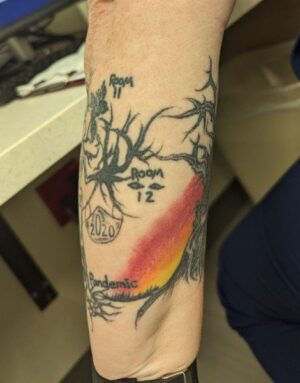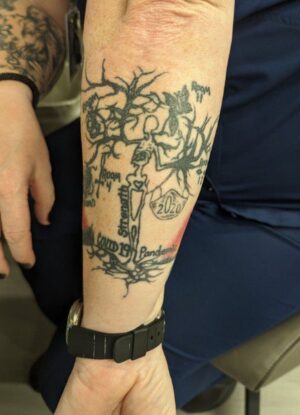
By Dillon Phillips
For some, the clock stopped during COVID. Each new year is just “2020 + X,” forever altering calendars in a way that never forgets the tragedy and trauma the pandemic wrought.
Few healthcare workers emerged unscathed, and in the case of Kim Sloan, the mark left by COVID was literal. Sloan is a tattooed ICU nurse who’s fond of motorcycle rallies—she and her husband, who is also an ICU nurse, were actually at Daytona Bike Week when COVID made landfall in the U.S. Her ink tells the story of the lives she saw lost and those she helped save.
A tree at sunset with room numbers and symbols hanging from its branches covers her left forearm. There’s a room 12 with eyes—reference to a patient who told Sloan, “I see you. You’re my angel.” There’s a room 3 with handcuffs for a patient who was a prisoner, her first patient to die from Covid. There’s a room 4 and a cross for a preacher, and an honesty symbol for a man who confided in Sloan shortly before his death.
And then there’s a butterfly emerging from a chrysalis. A lone image of hope surrounded by death.
That butterfly is Laconyea Lynn.
From Beachfront to Frontlines
Sloan and her husband were on vacation in Florida when the pandemic first hit. They were attending Daytona Bike Week, but they decided to return home early to surprise family. When the rally was canceled the next day due to COVID concerns, they knew something was seriously wrong.
They’d heard murmurs about how bad things were in the ICU at their hospital in Albany, Georgia. One of their fellow nurses described it as a “warzone” and warned them to get ready. But nothing could fully prepare them for what they were about to encounter.
“I was scared,” she said. “I was terrified. We’re coding patients left and right in the unit. We would come into work and think, ‘OK, whose patient is going to die today?’”
With the pandemic quickly spreading worldwide, Albany was essentially ground zero for COVID in the U.S. outside of New York.
“We were No. 4 per capita in the world for COVID deaths,” she said. “The only way that patients were leaving the ICU was in body bags.”
As weeks turned to months and the death toll mounted, only one COVID patient remained from the initial group: Laconyea Lynn.
“She was a fighter.”
Lynn was admitted at about the same time as her mother, but her mother died the day after Lynn was intubated.
For the next six weeks, Lynn continued to battle as others around her succumbed to the virus. Sloan provided daily updates to Lynn’s son, who is roughly the same age as Sloan’s children, via Zoom calls.
“Every day, he’s like, ‘How’s mom?’” Sloan said. “And I’d say, ‘Well, she’s still fighting. She’s still here.’ She was a fighter.”
When Sloan’s team began transporting patients to a new hospital that had been renovated just in time to serve as a COVID facility, Lynn was the first one to make the trip. Sloan did her best to keep up with Lynn and follow her recovery.
A few weeks later, Lynn had her trach and peg removed, allowing her to return to the main facility for rehab. After a total of 72 days in the hospital, she was discharged.
The staff cheered her on as she walked out of the hospital and into the arms of her son, who hadn’t seen her in person in nearly three months. Their reunion was captured on a video produced by Phoebe Putnam Health System.
“For her to walk out of the hospital when we thought she was going to die—it was just overwhelming,” Sloan said. “We were doing everything that we could, but because we got hit before anybody else got hit, we had nothing to reference.
“So, she was a miracle.”
Since her discharge, Lynn has stayed in touch with Sloan. The two even met for lunch and remain Facebook friends.
Looking back, Sloan said the experience revitalized her passion for nursing and even strengthened her marriage. It emphasized the importance of caring for the whole person and connecting with patients and their families on a human level.
“Being a nurse is more than just giving medicines and personal care,” Sloan said. “It’s touching the person inside.”
We thank these amazing caregivers for sharing their stories of care. If you would like to share why you answered the call to care or an impactful experience you’ve had as a traveler or healthcare professional, then send your story to CalledtoCare@medicalsolutions.com, and we’ll reach out to you if it is chosen.
Dillon Phillips is a content specialist for Medical Solutions.

